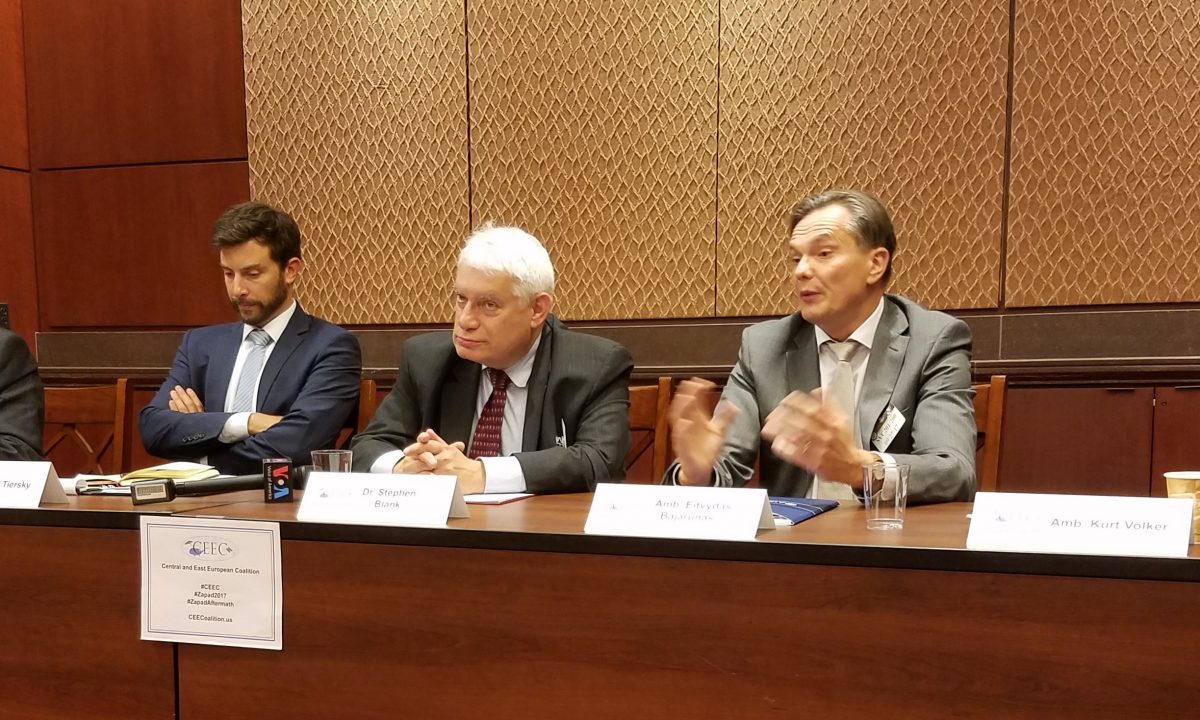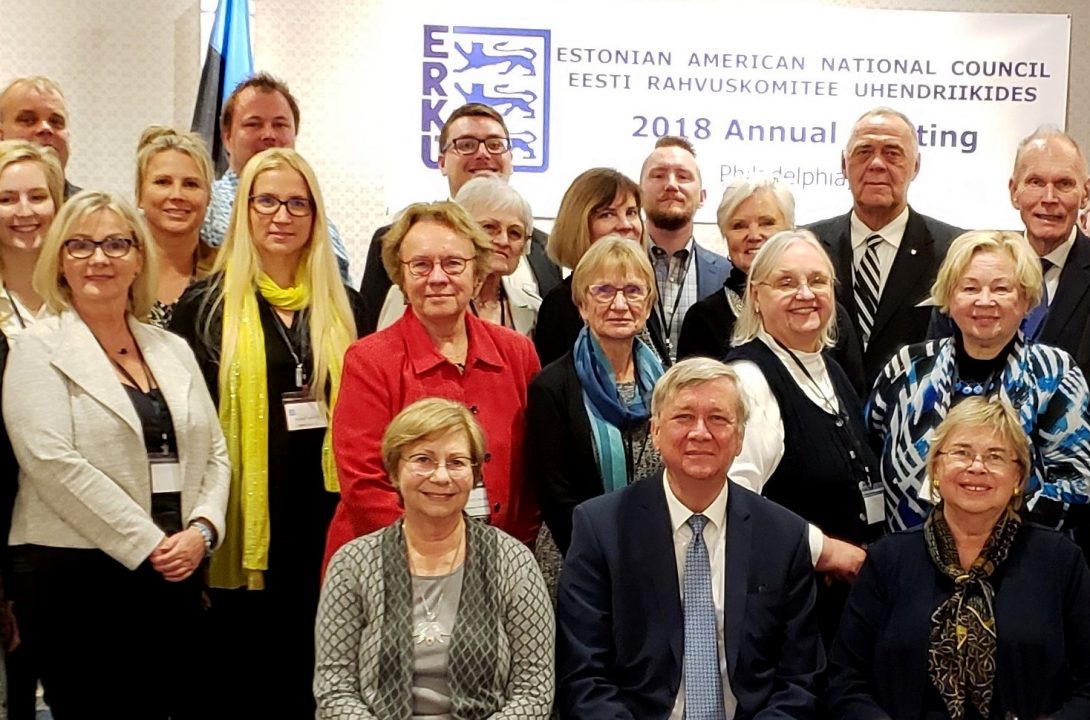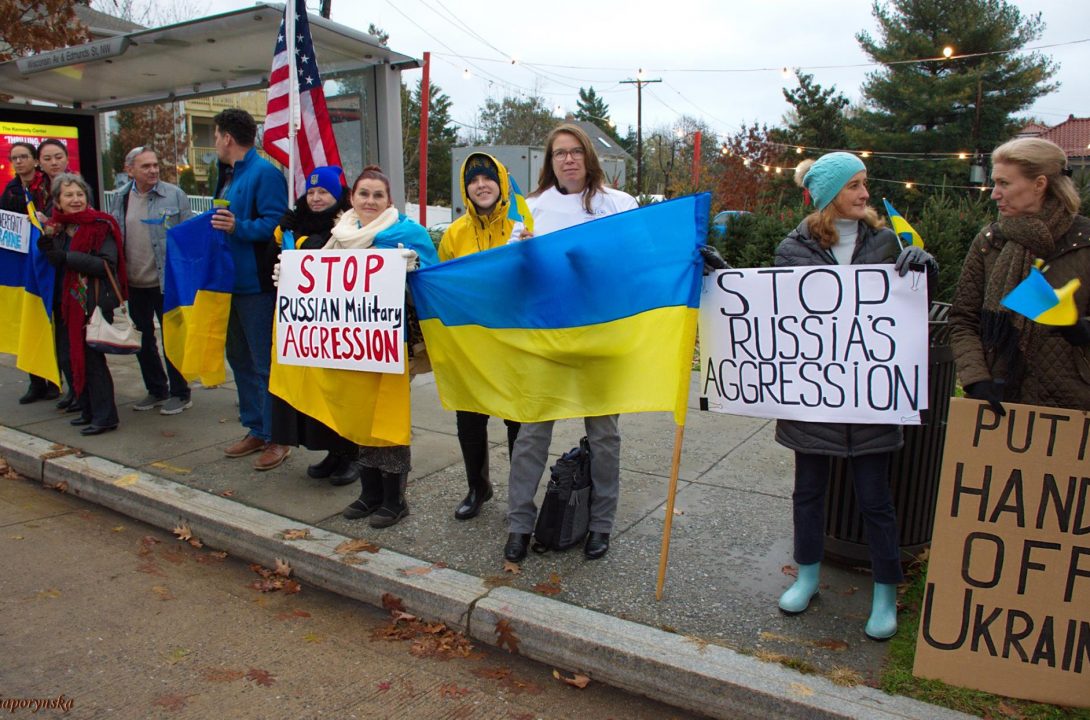
Stanford University Library Accepts Donations of Estonian books
August 16, 2017
2017 Black Ribbon Day Remembrance
September 1, 2017The Central and East European Coalition (CEEC) hosted a policy seminar on September 27th titled, Russia on NATO’s Doorstep: the West’s Response to the Kremlin’s Wargames, to examine the aftermath of Russia’s Zapad 2017 military exercises. The panel of experts consisted of Ambassador Kurt Volker, Special Representative for Ukraine Negotiations; Dr. Stephen Blank, American Foreign Policy Council Senior Fellow for Russia; Ambassador Eitvydas Bajarunas, Ambassador-at-Large for Hybrid Threats, Lithuanian Ministry of Foreign Affairs; and Alex Tiersky, Global Security and Political-Military Affairs Advisor, U.S. Helsinki Commission. The discussion was moderated by CEEC colleague, Dr. Mamuka Tsereteli of the Georgian Association in the U.S. Although analysis of the exercise will be ongoing for weeks, they offered their perspectives from their respective backgrounds and the information available so far.Panel line-up from right: Ambassador Volker, Ambassador Bajarunas, Dr. Blank, Mr. Tiersky, and moderator Dr. Tsereteli.
Ambassador Volker started off by acknowledging the CEEC’s important role in promoting NATO enlargement. He encouraged the coalition to continue its work to remind Congress and policymakers that these countries matter and constituents of heritage from the region care about U.S. policy affecting it. He then framed Zapad in a context of Russia on a trajectory that is still playing out. In the 1990s, Russia was trying to find its place in Europe. The Soviet Union had agreed to the fundamental principles of European security and cooperation outlined in the Helsinki Accords and seemed inclined to engage with Europe on those terms. Then Putin came to power and Russia’s policies began to contradict democratic values, taking an imperialistic view over all Russian speakers wherever they lived. Europe rejected him and concern over Russian expansionism set in.
Volker saw Zapad 2017 in this context as a vehicle for the Kremlin to demonstrate to its neighbors, domestic population, and to western Europe, recent improvements in the Russian military’s capabilities, doctrine and funding. At the same time, there was no indication of intent to expand geographically. Sanctions over Russia’s actions in Ukraine and increased activity in NATO have perhaps had an impact on Putin’s ambitions. Since the invasion, Ukraine has elected a government that is the opposite of his presumed goal – it is unified, anti-Russian, and westward-looking. Keeping the occupied territory in eastern Ukraine is coming at great cost to the Kremlin. Volker sees his task as bolstering Ukrainian will to facilitate the removal of Russian troops and reestablish sovereignty, while creating the right conditions for the Kremlin to see the withdrawal of troops as in its own interests.
Dr. Blank identified the need for NATO to understand the threat before it can act effectively in consensus. Russia sees itself at war with the West even if Europe doesn’t want to admit it. Democratic transatlantic integration threatens Putin, who doesn’t acknowledge the post-Cold War settlement or sovereignty of any eastern European state. He has no hesitation to exploit Western vulnerabilities, whether through corruption, access to energy resources, or ethnic and religious tensions. His objective is to fracture Western cohesion. Blank also noted that while strong transatlantic ties may threaten Putin, they actually work in the interests of Russia’s population and well-being as a nation.
Blank went on to assess the region’s military situation. He emphasized the importance of enhanced cooperation between NATO and its Nordic partners, specifically Sweden and Finland, to fill in gaps in air and naval capabilities. Increased defense spending, better freedom of movement for deploying troops, and joint training and exercises in the theater also play key roles in deterrence. On a more concerning note, while there is an ongoing debate among allies on the role of nuclear weapons in the defense of Europe, Russia has multiple new nuclear procurement programs and has violated every arms treaty except New START with no repercussions.
Mr. Tiersky was the only U.S. official invited by the Belarusian government to take part in the observer events for the exercise. The Belarusian Ministry of Defense held a briefing of the scenario and troops involved, characterizing it as completely defensive and reporting that all Russian forces and equipment would leave upon completion of the training. Tiersky reported that the view given to the observers was too limited to tell the actual extent of the maneuvers. Assessments are still in progress and there was no consensus yet on what really took place. The NATO commander’s office issued preliminary findings that the exercise was bigger than reported beforehand but there were no reports of the extensive alarming pre-exercise speculation coming true. Tiersky noted that Belarus should be commended for offering some degree of transparency, indicating possible signs of new openness to the West, or perhaps a statement of sovereignty. It was not, however, the full level of transparency that Western analysts had hoped for.
Tiersky identified a larger problem, in that Russia is failing to abide by multiple treaties. They tend to avoid full reporting of their military training by conducting short-notice, so-called snap exercises, which don’t require the same level of reporting as scheduled exercises. Helsinki Commission members need to revitalize their discussion on modernizing the Vienna Document to account for snap exercises and address the censure the Russian delegation faces on a regular basis.
Ambassador Bajarunas shared his views on the allies’ tendency to overemphasize the military aspects of the threat from the Kremlin, recommending continued investment in defense against both conventional and unconventional tactics. He expressed the need for U.S. presence in the region with both military and government representation to cement resilience against the asymmetric threat. Internal reforms are also necessary in many countries to address media literacy, corruption, intelligence sharing and other weak points that Putin can exploit.
In the end, the panel agreed that the principles of the Helsinki Accords should be upheld and allies should be clear that NATO’s mission is purely defensive. Regardless of the final assessments on the meaning of this Zapad, the transatlantic community needs to reinforce for future generations the importance of intellectual, moral, economic, military and political unity for the health and well-being of all nations. In the U.S., the CEEC can continue to advocate for policy that promotes democratic ideals and security for central and eastern Europe and beyond.
The CEEC was established in 1994 to coordinate the efforts of ethnic organizations whose members continue to maintain strong cultural, economic, and political ties to the countries of central and eastern Europe. It represents Americans of Armenian, Belarusian, Bulgarian, Czech, Estonian, Georgian, Hungarian, Latvian, Lithuanian, Polish, Romanian, Slovak, and Ukrainian descent. Its member organizations, including the Estonian American National Council, cooperate in calling attention to issues of mutual concern, especially regarding United States policy toward Central and East Europe. Please see ceecoalition.us for more information.




